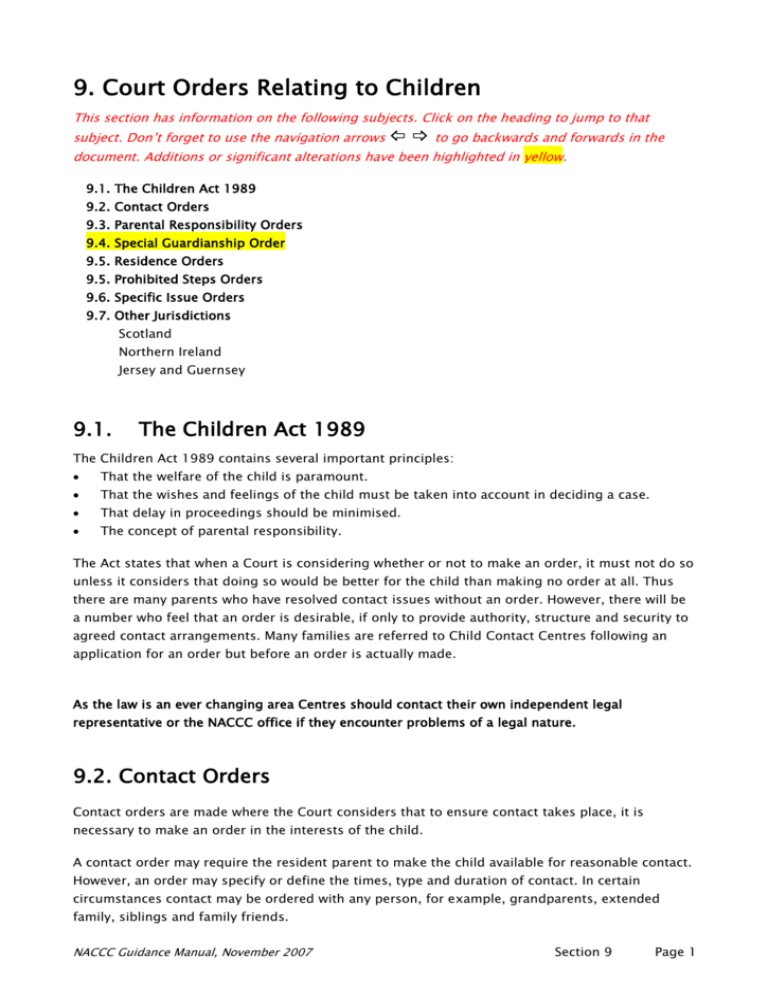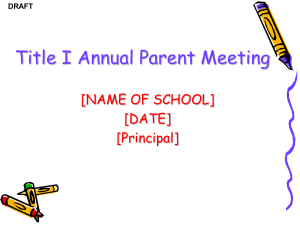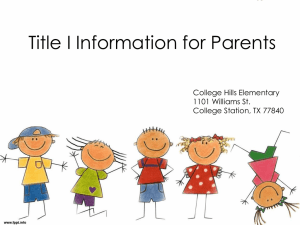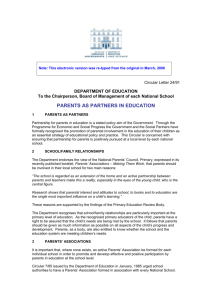9._Court_orders_relating_to_children
advertisement

9. Court Orders Relating to Children This section has information on the following subjects. Click on the heading to jump to that subject. Don’t forget to use the navigation arrows to go backwards and forwards in the document. Additions or significant alterations have been highlighted in yellow. 9.1. The Children Act 1989 9.2. Contact Orders 9.3. Parental Responsibility Orders 9.4. Special Guardianship Order 9.5. Residence Orders 9.5. Prohibited Steps Orders 9.6. Specific Issue Orders 9.7. Other Jurisdictions Scotland Northern Ireland Jersey and Guernsey 9.1. The Children Act 1989 The Children Act 1989 contains several important principles: That the welfare of the child is paramount. That the wishes and feelings of the child must be taken into account in deciding a case. That delay in proceedings should be minimised. The concept of parental responsibility. The Act states that when a Court is considering whether or not to make an order, it must not do so unless it considers that doing so would be better for the child than making no order at all. Thus there are many parents who have resolved contact issues without an order. However, there will be a number who feel that an order is desirable, if only to provide authority, structure and security to agreed contact arrangements. Many families are referred to Child Contact Centres following an application for an order but before an order is actually made. As the law is an ever changing area Centres should contact their own independent legal representative or the NACCC office if they encounter problems of a legal nature. 9.2. Contact Orders Contact orders are made where the Court considers that to ensure contact takes place, it is necessary to make an order in the interests of the child. A contact order may require the resident parent to make the child available for reasonable contact. However, an order may specify or define the times, type and duration of contact. In certain circumstances contact may be ordered with any person, for example, grandparents, extended family, siblings and family friends. NACCC Guidance Manual, November 2007 Section 9 Page 1 A court does not have the power to order that contact should take place at a Child Contact Centre, nor is it empowered to order a Child Contact Centre to supervise contact without the agreement of the Co-ordinator. A number of Judges and Magistrates have failed to understand that voluntary Child Contact Centres offer supported as opposed to supervised contact, NACCC has therefore written to all family courts with an explanation of the difference between these two concepts and the Judges Protocol and the Family Law Protocol have been introduced (see Section 15. Appendices). Penal Notices If a defined order fails in its purpose, then where the proceedings are in a County Court / High Court the aggrieved party can apply for a notice (called a penal notice) to be attached to the order, warning the parent in breach that he/she may be committed to prison for contempt of court if he/she should breach specific provisions of the order. Should the parent in breach fail to comply with the terms of the order, when a penal notice is attached to the order, he/she then becomes at risk of imprisonment. In practice, courts are very reluctant to take this step even if the nonresident parent is willing to care for the child. Indirect Contact A contact order can provide for indirect contact, either instead of, or in addition to, defined contact. Indirect contact includes letters, cards, photographs and telephone calls and may be incorporated within a defined order where the non-residence parent also sees the child. Indirect Contact is not available via a Supported Centre. 9.3. Parental Responsibility Orders Parental responsibility means the rights and responsibilities conferred by the law on certain parents. If the parents are married at the time their child is born then both automatically have parental responsibility. Each has a say in decisions about the child’s schooling, residence, medical treatment, choice of name and religious upbringing. If the parents are not married at the time of the child’s birth, only the mother has parental responsibility. However, if they subsequently marry the father will share parental responsibility. A non-marital father may only acquire parental responsibility in any of the following ways: 1. By jointly registering the birth with the child’s mother and having their name on the birth certificate. Please note this only applies to any child born on or after the 1st December 2003. 2. A legal agreement with the mother, in which she states she is willing to grant him parental responsibility which is filed with the Principal Registry of the Family Division of the High Court. An agreement will only take effect once filed. 3. A court order in which the father is granted parental responsibility. Normally this is only granted where he has shown a level of commitment or attachment to the child. 4. By obtaining a residence order for the child. If this happens the father also needs to ask the court to make a parental responsibility order in his favour for the same child. Other persons e.g. guardians, grandparents, step-parents can also acquire parental responsibility by being Section 9 Page 2 NACCC Guidance Manual, November 2007 granted a residence order, but cannot just apply for a parental responsibility order themselves. 5. A stepfather can acquire parental responsibility by adopting the child jointly with its birth mother or in some circumstances, for example, if mother is dead, by adopting as a sole applicant. A step-parent or civil partner can share parental responsibility by agreement with the parent and with the consent of any other person with parental responsibility. Without such agreement the step-parent or civil partner has to apply to court. Without parental responsibility an unmarried father has no say in decisions about the child's upbringing. This can lead to fathers feeling angry and resentful when they visit the Child Contact Centre to see their child. Child Contact Centres and children in the care of the Local Authority After the Children Act came into force in October 1991 a child taken into care by a Local Authority became the joint responsibility of that Local Authority and the child’s parents (or the mother if the father did not have parental responsibility). This was not the case before implementation of the Act and Local Authorities did not always maintain contact between the child in care and its parents. Given the duty now placed on them to preserve such links, Child Contact Centres can become the venue for this type of contact – which often means long-term use and raises questions as to whether this is appropriate if there is a limited amount of accommodation. 9.4. Special Guardianship Order Created by the Adoption and Children Act 2002 this is a half way house between a residence order and adoption and will apply mainly to children within the public law arena. It was created to give a greater degree of permanency without the finality of adoption. Whilst a Special Guardianship Order is in force no other person can exercise parental responsibility. 9.5. Residence Orders A residence order states that a child should live with a particular person. It is made when 1. There is a dispute about with whom the child should live. 2. There is a risk of abduction. It is possible to make a joint or shared residence order in favour of both parents where they are separated and the number of these orders is slowly increasing 9.6. Prohibited Steps Orders A prohibited steps order prohibits the person named from doing a specific act that would otherwise be lawful for them to do. For example the order might state that: “John Smith is hereby prohibited from removing the child Mary Smith from the care of mother without her written consent or that of the court”. It could of course be worded so as to prevent a child being removed from a Child Contact Centre during contact. The consent of the Child Contact Centre Co-ordinator should be sought in advance of this happening. NACCC Guidance Manual, November 2007 Section 9 Page 3 Prohibited steps orders can also be made to prevent a parent with care from taking a child abroad, or a non-resident parent taking a child abroad during a contact visit. 9.7. Specific Issue Orders This type of order is made by the court to deal with any aspect of parental responsibility that is in dispute. It can be used e.g. where two parents, each with parental responsibility, cannot agree on which school the child will attend or by what surname the child will be known. 9.8. Other Jurisdictions The Laws and Orders referred to above and in the following chapter on Injunctions apply only to England and Wales. NACCC has member Centres in or links with Centres in other legal jurisdictions in the British Isles – Scotland, Northern Ireland, the Isle of Man and the Channel Islands. The law in these countries is sometimes very different and if further clarification is required on any referrals from such areas then please contact the NACCC office. Scotland The law in Scotland is governed by the Children (Scotland) Act 1995 which is very similar to the Children Act 1989 except that it defines Parental Rights and responsibilities to include a parents’ right to contact. As these rights are possessed automatically by married parents, most parents who use Scottish contact centres are unmarried. Most family cases are heard in the Sheriff Court with more serious matters being heard by the Court of Sessions. Much terminology is common such as Residence Order, Contact Order, Specific Issue Order and Prohibited Steps Order however Injunctions are referred to as Interdicts and a court order for defined contact is an Interlocutor. Maintenance is referred to as aliment. There is no equivalent to CAFCASS as such but there are Court Appointed Reporters who are appointed individually from a list to report on the facts of a situation and Curators ad Litem who are appointed to make recommendations as to the best option for the child. Northern Ireland The law in Northern Ireland is governed by the Children (Northern Ireland) Order 1995, which is also very similar to the Children Act 1989 and uses the same terminology. The Order was amended in April 2003 to enable an unmarried father whose name appears on the child’s birth certificate to automatically acquire parental responsibility. This only applies to children born on or after 15 April 2003. Many family cases are heard in the Magistrates Court with only the more complex being heard by the Family Care Centre or High Court. There is no equivalent to CAFCASS in private law cases but in public law proceedings children may have a Guardian ad Litem as well as their own solicitor. Jersey and Guernsey The law in each of these jurisdictions is similar to the other but not identical. Jersey is in the process of introducing a version of the Children Act but there is no date for implementation. One very important point to note is that in Jersey the father of a legitimate child has sole custody. Section 9 Page 4 NACCC Guidance Manual, November 2007 The terminology on both islands remains that of custody and access rather than residence and contact. Access at a Child Contact Centre is very much a last resort. The Hague Convention does not apply so English courts will not automatically return abducted children to either of the islands or vice versa and English contact orders are not enforceable there. NACCC Guidance Manual, November 2007 Section 9 Page 5 Section 12 Page 6 NACCC Guidance Manual, November 2007







